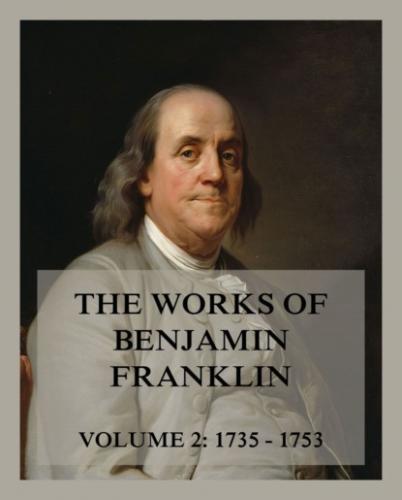The Works of Benjamin Franklin
Volume 2
BENJAMIN FRANKLIN
The Works of Benjamin Franklin, Volume 2
Jazzybee Verlag Jürgen Beck
86450 Altenmünster, Loschberg 9
Deutschland
ISBN: 9783849653996
www.jazzybee-verlag.de
CONTENTS:
CORRESPONDENCE AND MISCELLANEOUS WRITINGS 1726 - 1735. 1
XVI: ON THE USEFULNESS OF THE MATHEMATICS Ref. 002 1
XX: THE WASTE OF LIFE Ref. 014 11
XXX. AN ACCOUNT OF THE NEW-INVENTED PENNSYLVANIAN FIRE-PLACES Ref. 022; 42
L. TO JAMES LOGAN Ref. 061 118
LX. ADVICE TO A YOUNG TRADESMAN... 130
LXX. TO CADWALLADER COLDEN.. 156
XC. TO JOHN PERKINS Ref. 114 206
CORRESPONDENCE AND MISCELLANEOUS WRITINGS
1726 - 1735
XVI: ON THE USEFULNESS OF THE MATHEMATICS Ref. 002
MATHEMATICS originally signified any kind of discipline or learning, but now it is taken for that science which teaches or contemplates whatever is capable of being numbered or measured. That part of the mathematics which relates to numbers only is called arithmetic; and that which is concerned about measure in general, whether length, breadth, motion, force, &c., is called geometry.
As to the usefulness of arithmetic, it is well known that no business, commerce, trade, or employment whatsoever, even from the merchant to the shopkeeper, &c., can be managed and carried on without the assistance of numbers; for by these the trader computes the value of all sorts of goods that he dealeth in, does his business with ease and certainty, and informs himself how matters stand at any time with respect to men, money, or merchandise, to profit and loss, whether he goes forward or backward, grows richer or poorer. Neither is this science only useful to the merchant, but is reckoned the primum mobile (or first mover) of all mundane affairs in general, and is useful for all sorts and degrees of men, from the highest to the lowest.
As to the usefulness of geometry, it is as certain that no curious art or mechanic work can either be invented, improved, or performed without its assisting principles.
It is owing to this that astronomers are put into a way of making their observations, coming at the knowledge of the extent of the heavens, the duration of time, the motions, magnitudes, and distances of the heavenly bodies, their situations, positions, risings, settings, aspects, and eclipses; also the measure of seasons, of years, and of ages.
It is by the assistance of this science that geographers present to our view at once the magnitude and form of the whole earth, the vast extent of the seas, the divisions of empires, kingdoms, and provinces.
It is by the help of geometry the ingenious mariner is instructed how to guide a ship through the vast ocean, from one part of the earth to another, the nearest and safest way and in the shortest time.
By help of this science the architects take their just measures for the structure of buildings, as private houses, churches, palaces, ships, fortifications, &c.
By its help engineers conduct all their works, take the situation and plan of towns, forts, and castles, measure their distances from one another, and carry their measures into places that are only accessible of the eye.
From hence also is deduced that admirable art of drawing sun-dials on any plane howsoever situate, and for any part of the world, to point out the exact time of the day, sun’s declination, altitude, amplitude, azimuth, and other astronomical matters.
By geometry the surveyor is directed how to draw a map of any country, to divide his lands, and to lay down and plot any piece of ground, and thereby discover the area in acres, rods, and perches; the gauger is instructed how to find the capacities or solid contents of all kinds of vessels, in barrels, gallons, bushels &c.; and the measurer is furnished with rules for finding the areas and contents of superficies and solids, and casting up all manner of workmanship. All these and many more useful arts too many to be enumerated here, wholly depend upon the aforesaid sciences—viz., arithmetic and geometry.
This science is descended from the infancy of the world, the inventors of which were the first propagators of human kind, as Adam, Noah, Abraham, Moses, and divers others.
There has not been any science so much esteemed and honored as this of the mathematics, nor with so much industry and vigilance become the care of great men, and labored in by the potentates of the world,—viz., emperors, kings, princes, &c.
Mathematical demonstrations are a logic of as much or more use than that commonly learned at schools, serving to a just formation of the mind, enlarging its capacity, and strengthening it so as to render the same capable of exact reasoning, and discerning truth from falsehood in all occurrences, even subjects not mathematical. For which reason, it is said, the Egyptians, Persians, and Lacedæmonians seldom elected any new kings but such as had some knowledge in the mathematics, imagining those who had not, men of imperfect judgments and unfit to rule and govern.
Though Plato’s censure, that those who did not understand the 117th proposition of the 13th book of Euclid’s Elements ought not to be ranked amongst rational creatures, was unreasonable and unjust; yet to give a man the character of universal learning, who is destitute of a competent knowledge in the mathematics, is no less so.
The usefulness of some particular parts of the mathematics in the common affairs of human life has rendered some knowledge of them very necessary to a great part of mankind, and very convenient to all the rest that are any way conversant beyond the limits of their own particular callings.
Those whom necessity has obliged to get their bread by manual industry, where some degree of art is required to go along with it, and who have had some insight into these studies, have very often found advantages from them sufficient to reward the pains they were at in acquiring
